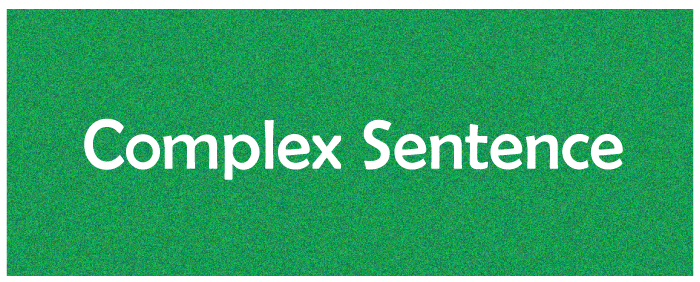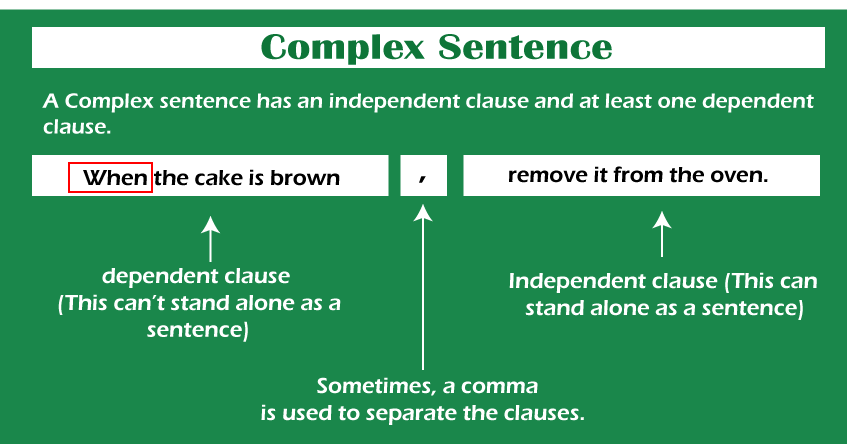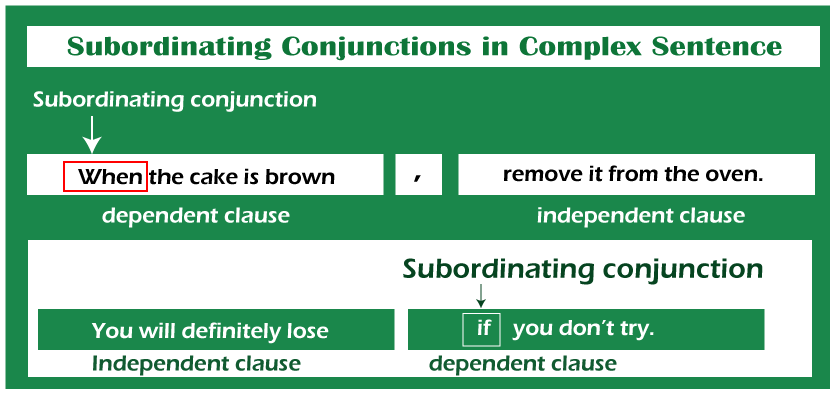Complex SentenceComplex sentences are those which contain a minimum of one independent clause and one subordinate clause. It performs best when you need to add more information to elucidate or change the main argument of your sentence. These statements are easy to identify since these often comprise subordinating conjunctions to link clauses. These include because, since, or until. 
Why are they referred to as "complex"? Complex sentences vary from simple sentences, yet they share some characteristics with compound sentences. Does that sound complicated? Don't worry; they're simple to use once you know how they function, which we'll go over in detail below. Read on to know about simple sentences, complex sentences, independent clauses, and dependent clauses. Also, read on to learn about several examples of complex sentences. What Is a Complex Sentence?These types of sentences are one of the four structurally distinct kinds of sentences (simple, complex, compound, and compound-complex). Their distinguishing feature is the presence of a dependent clause, which is seen only in complex and complex-compound sentences. 
Dependent clauses, also called subordinate clauses are sentences that cannot exist alone. Thus, the dependent clauses are just merely sentence fragments without the independent clauses. Incorrect: When I enter adulthood. Correct: When I enter adulthood, I'll utilize complete statements. Conditional sentences, which explain hypothetical circumstances using an if-then framework, are one of the most common forms of complex statements. One clause in a conditional statement is true only if both clauses are genuine. What Is the Distinction Between Independent And Dependent Clauses?Understanding the distinction between independent and dependent clauses is essential for employing complicated sentences. Independent clauses, on the other hand, are entire sentences on their own, but dependent clauses really aren't. Also, both of these sentences have the subject and the verb, but just one is considered a full sentence while the other is considered as a dependent. Have you thought about this why? The quick answer would be that subordinating conjunctions always precede dependent clauses. These subordinating conjunctions, in a sense, convert independent clauses into dependent clauses. Because, if, since, when, until, even though, while, now that, and specific usage of the preposition like before and after, you're undoubtedly already familiar with several popular subordinating conjunctions. A subordinating conjunction turns one clause into a description of another. Dependent clauses modify the meaning of independent clauses in this manner. Consider the following independent clause: You cannot exit the building. That sounds terrifying! This independent clause suggests that you must be in the building indefinitely. Let's now add a dependent clause to produce a more complex sentence that simplifies things even further: You cannot exit the building until the final bell. Notice how the dependent clause alters the core point's meaning? Simple Vs. Complex SentencesThe distinction between simple and complex sentences is simpler to understand. Simple sentences are those that comprise only one independent clause. Any sentence having more than one clause, encompassing a complex statement, cannot be a simple sentence. Surprisingly, you can occasionally combine two basic statements to form one complex sentence by adding a subordinate conjunction. Simple SentencesHelen ate a massive croissant. He got a tummy pain. Complex SentenceAfter Helen ate a massive croissant, he got tummy pain. How to Write a Complex SentenceAlthough conditional statements can be difficult to understand, complex sentences, in general, follow simple grammar rules. In complex sentences, you just need to worry about commas if you use the correct subordinate conjunction. The use of a comma is determined by which clause comes initially:
To demonstrate, consider the following complicated sentence examples: When crocodiles attacked the men, where were the safeguards ? Where were the safeguards when crocodiles attacked the men ? Complex Sentences ExamplesThe subordinate clause appears first in the examples of complex phrases below. The subordinate clause commences with a subordinating conjunction (terms like while, because and while) and is parted by the comma: Let us see some of the examples;
The independent clause appears first in the complex sentence examples presented below. In most situations, the clauses are not separated by a comma, as is the typical pattern in complicated sentences that begin with an independent clause. The last example, however, includes a comma because it represents an extreme contrast. This strong contrast implies to clauses expressing notions that are nearly opposite in meaning or must be highlighted heavily.
Independent and Dependent ClausesWe've already mentioned that a complex sentence has an independent clause and, at minimum, one dependent clause. But what exactly are clauses in a sentence? And why do they matter in grammar? Consider the following example of a complex sentence: I enjoy eating candy before watching a film. As previously indicated, "I enjoy eating candy" is an independent clause. As a solo sentence, it is completely logical and sensible. "Before I watch a film" is meaningless on its own. However, let us change the wording slightly: I enjoy eating candy, but I dislike eating chips. The sentence now has two independent clauses- this includes "I enjoy eating candy" and "I dislike eating chips," which can form complete sentences. The example has now evolved into a compound sentence, which consists of two separate clauses connected by a coordinating conjunction (but). When a subordinating conjunction is introduced to a sentence, however, a crucial distinction must be made. Since, whenever, although, and because are examples of words that turn a clause a dependent clause, even if it appears to be an independent clause. I enjoy eating candy (independent clause - makes sense independently). Because I enjoy eating candy (dependent clause - does not make sense independently without more details). Examples of Common Complex SentencesAs we've seen in earlier examples, the structure of a complex statement looks somewhat like this: Independent Clause + Dependent Clause (comma splits the clause) Independent and dependent clauses (comma normally doesn't split the clause) As a result, we can readily construct instances of complex sentences using that framework:

It's also worth noting that a complex statement can comprise more than one dependent clause. Here are few examples of such complex sentences:
Subordinating ConjunctionsIn English, there are hundreds of subordinating conjunctions, and their employment is inextricably related to dependent (subordinate) clauses. Subordinating conjunctions commonly used encompass: after, before, even though, although, as much as, when, whenever, because, as long as, while, and since. These words and phrases serve as sentence modifiers, occasionally converting an independent clause into a dependent clause. 
There are two approaches to thinking about subordinating clauses:
In Complex Sentences, Use Subordinate ClausesAs previously stated, a subordinate clause is yet another word for a dependent clause. Both words, subordinate and dependent, provide hints to assist us in better comprehending how these clauses perform in writing. Subordinate means inferior in rank or position, whereas dependent implies reliant on or governed by. That means that subordinate/dependent clauses are not equivalent to the independent clauses in the sentence. The independent and subordinate clauses are not the same, as the latter cannot stand alone to construct a sentence. As such, the subordinate clause is reliant on the independent clause for full meaning. A complex sentence cannot be constructed without a subordinate clause. Other kinds of sentences, such as compound and simple sentences, can occur in the absence of subordinate clauses. When you consider it, the subordinate clause is what provides the sentence with its true meaning. The subordinate clause, when you consider it, is what makes the statement' complex.' The independent clause is necessary for the subordinate clause to sound right. It stretches back or forth across the sentence to the context itself, thus making the statement more 'complex.'
Next TopicComplex Sentence Examples
|
 For Videos Join Our Youtube Channel: Join Now
For Videos Join Our Youtube Channel: Join Now
Feedback
- Send your Feedback to [email protected]
Help Others, Please Share









